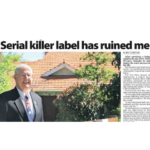Chris Dawson to Face Judge-Alone Trial for the Alleged Murder of his Wife

The former footballer and high school teacher is facing criminal proceedings for the alleged murder of his wife, who mysteriously disappeared in 1982.
Since Lynnette Dawson’s disappearance, there have been two coronial inquests and several police investigations, as well as a lot of media speculation, rumour and conjecture.
The mother of two young children lived with her husband in Bayview, on Sydney’s Northern Beaches.
She made arrangements to meet with her mother on the day of her disappearance but did not show up.
Mr Dawson had a successful career as a rugby league player, before becoming a high school physical education teacher.
Rumours of sexual associations with high school students have long surrounded Mr Dawson and his identical twin brother.
Lynette body has never been located, but the coronial inquests determined she was murdered by someone she knew.
Charges were not laid after either inquest as prosecutors came to the view that insufficient admissible evidence was available to do so.
In 2018, further police investigations led to charges finally being laid.
Mr Dawson was arrested in Queensland and extradited to New South Wales to face the criminal proceedings.
He has always maintained his innocence and has pleaded not guilty.
High profile case
Lynette’s murder has been the subject of several books and a very well received Apple podcast, which was taken down when police re-opened their investigations in 2018.
Mr Dawson has tried unsuccessfully to have the trial proceedings ‘stayed’ – deferred or stopped completely, offering a range of arguments – over the past two years, but today Justice Robert Beech Jones of New South Wales Supreme Court determined that Mr Dawson should face a judge alone trial when his case begins in the coming days.
This means Mr Dawson will not be tried by a jury of his peers. And often this is a sensible solution in high-profile cases where there are concerns that it would be very difficult to find 12 completely impartial jurors.
The other benefit to Mr Dawson at this time – even though Courts do have rigorous processes and procedures in place to mitigate the spread of Covid-19 – is that a judge-alone trial is more likely to proceed without delay or interruptions.
Judge-alone versus jury
While the justice process for serious criminal cases has traditionally relied on trial by jury – and still does – trials by judge-alone are not uncommon.
Often for defendants, the verdict in a judge-alone trial can be ‘more transparent’ because judges are required to give the reasons for their verdicts. By comparison, juries deliberate behind closed doors, and do not have to explain how, or justify why, they reached their conclusions.
In very complex cases, where there is a considerable amount of technical evidence, judges are often better equipped to analyse the evidence as well as what aspects of the evidence are relevant to the case at hand. Juries don’t always have that level of expertise.
That said – juries bring the wider conscience of the community to bear on trials in a way that a judge may not be able to do.
In terms of the legal aspects of a trial, jurors receive directions during the judge’s summing up of the case, and can also receive those instructions through the course of the trial, in order to ensure that only relevant matters are considered.
Murder – maximum penalty and standard non-parole period
Mr Dawson is now 73 years old, and if convicted of murder he could spend the rest of his life behind bars.
The maximum penalty for murder is life imprisonment and in New South Wales, ‘life’ means for the term of the person’s natural life; in other words, until he or she dies.
However, the sentencing judge will consider a very wide range of factors when determining the appropriate penalty in any particular case. These factors are both objective – such as the seriousness of the conduct itself, and subjective – such as the defendant’s criminal history (if any), contrition/remorse, prospects for rehabilitation, likelihood of reoffending and so on.
The ‘standard non-parole period’ (SNPP) for murder is 20 years in prison. An SNPP is a guidepost or reference point for a sentencing judge when he or she is determining the non-parole period (minimum term) a person must spend in prison before becoming eligible to apply for release on parole.
When can a defendant have a judge-alone trial in New South Wales?
Amendments in 1990 to the Criminal Procedure Act 1986 (NSW)(the Act) allowed for trials by judge alone in respect of state offences where the prosecution consented.
The Act was amended in 2011 to enable the defendant to apply for such trial in the absence of consent.
The relevant substantive rules are now embodied in sections 132, 132A and 133 of the Act.
Section 132 provides that a defendant or prosecutor may apply for a District or Supreme Court trial to be tried by a judge alone – which is referred to as a ‘trial by judge order’.
The section says that upon such an application being made, the court:
- Must make such the order if both parties agree,
- Cannot make the order if the defendant disagrees,
- May make the order if the prosecution disagrees if it is in the interests of justice to do so,
- May refuse to make the order if the trial will involve a factual that requires the application of objective community standards, such as reasonableness, negligence, indecency, obscenity or dangerousness,
- Must refuse to make the order unless satisfied the defendant has sought and received advice about such orders from an Australian lawyer, and
- May make the order despite any of the above if there is a substantial risk a jury trial may lead to an offence of interfering with jurors, witnesses or judges under sections 320 to 326 of the Crimes Act 1900 (NSW), and that risk cannot be mitigated.
Section 132A requires that an application under section 132 for criminal proceedings must be made at least 28 days before the trial date, except with the leave (permission) of the court.
It further provides that an application must not be made in a joint trial – meaning a trial with more than one defendant – unless all defendants apply and each application is made in respect of all offences being tried.
Section 133 empowers a judge sitting alone in criminal proceedings to make findings of fact, which is normally the responsibility of the jury. It requires the judge to include the applied principles of law and findings of fact in any judgement, and to take into account any warnings that would normally be given to the jury.
‘Objective Community Standards’
The provision in section 132 that the court may refuse a judge alone application by a defendant if the case involves the application of ‘objective community standards’ has been the subject of judicial interpretation.
Some situations are relatively straightforward, such as offences which contain essential elements embodying reasonableness, indecency or offensiveness. Others are less clear-cut, such as those involving questions of credibility and intent.
In the 2008 High Court case of AK v State of Western Australia Heydon J provided the following guidance:
“Examples of factual issues requiring the application of “objective community standards” include whether behaviour was “threatening, abusive or insulting”; whether conduct was “dishonest”… whether an assault is “indecent”; and whether an accused person had a particular intention.”
The 2008 NSWCC case of R v Belghar involved a family altercation at a shopping centre whereby one family member was charged with attempted murder and attempting to inflict grievous bodily harm with intent. Chief Justice Mclelland found in that case that the facts did not require the application of community standards.
Making an application
Application under section 132(1) are made by completing and filing NSW Supreme Court Form 74AJ
The application is an interlocutory decision, the refusal of which may be appealed.








